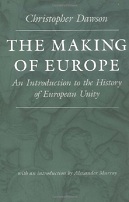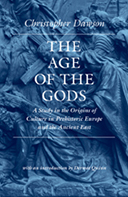In this work, originally published in 1959 during his tenure at Harvard, Christopher Dawson republished articles originally appearing in several different magazines as well as the whole of the booklet The Revolt of Asia, first published by Sheed & Ward in 1957.
Central Themes
One of the main ideas of this book, which is set out in the introductory chapter on The Relevance of European History is that the revolutionary movements which characterised the 20th century have their roots in European ideas – liberalism, socialism, nationalism – and it is therefore to Europe that we must look in order to understand the political and ideological conflicts of the 20th century.
In a more general sense, a major theme of the work is that cultures in every age are changed by contact with outside forces (in both directions). For example, Western economic influence on the East and elsewhere brought with it Western nationalistic and democratic ideas, even if these ideas were then used against the West in anti-imperialist movements, whether in India, Africa or China. Those who came to the West to learn about its technology returned as ‘converts’ to its ideas and then became ‘apostles’ of those ideas in their own countries.
Thus, for Dawson, the global culture we have today is the result of this worldwide Western influence. To regard the study of European history as ‘provincial’ or ‘ethnocentric’, as many of his contemporary historians did, is to miss an important point.
The two chapters on Renaissance and Reformation and Rationalism and Revolution are among the most fascinating, if complex, of the whole book. They reveal with a wealth of historical detail how an understanding of the conflicting religious, political and philosophical ideologies from Luther to Voltaire and Marx can help us to understand better the emergence of the new socioeconomic world order of the 20th century.
Dawson also observes that in the 20th century there has been a massive expansion of Christianity worldwide, contrasting with a corresponding recession of belief within Christendom itself. He sees the expansion of Western ideologies and religious ideas as creating the bases for a new world civilisation in the future. But what will this world civilisation be like? Will it be secular or Christian, or something different? Whatever the answer, he maintains that “neither the technological process that is forcing East and West together, nor the insurgence of nationalist forces that is tearing them apart can save the modern world from destruction. Salvation can only come from some power capable of creating a spiritual unity which will transcend and comprehend the material unity of the new world order. And where can this power be found save in religion?”
PRAISE FOR THE ORIGINAL EDITION:
With a vision and flexibility not always apparent in cultural historians, Dawson dedicates the same ample scholarship and perceptive intelligence to the West’s relations with non-Western peoples in a period of violent world-wide revolution. By doing so he deepens our understanding of the changes shaking the world and widens our vision of the tasks before us… This study of the movement of ideas that made Europe enables Dawson to give a far deeper and more satisfying account of the West’s impact on the outside world than is possible in the usual brisk history of Western colonialism and Eastern change. – New York Times Book Review


